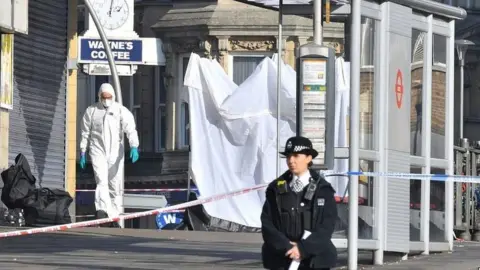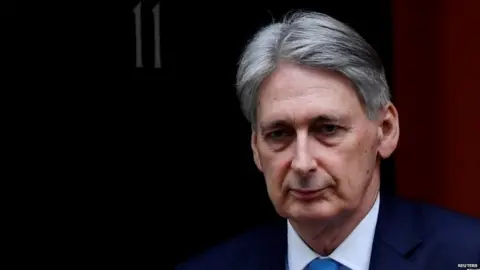Knife crime and the austerity question
 PA
PAThe most awful political truth about the flare-up in knife crime is that it is so familiar.
From time to time, a flurry of terrible attacks emerges, the public is alarmed and politicians debate what can be done.
Frankly then, many of the solutions that are often put forward are familiar too. And for a time, genuinely trying to focus on this kind of violence is a prominent political priority.
But also familiar is the narrative where that focus then fades over time and the political grip is loosened. What's difficult for politicians grappling with it this time round is not just that the real solutions might take a long time to pursue and make real - that's a familiar truth.
But this government has a different problem too - maybe it's not, beyond Brexit, quite sure what it wants to be. It's not so long ago that the prime minister proclaimed that austerity, the code name for years of squeeze on the public sector, was coming to an end.
Having made such a commitment you might imagine that when the Home Office asks for more money to help tackle knife crime because of what appears an acute political problem, it would be forthcoming.
But money is still tight, and the Treasury is reluctant to open the cheque book, not least because the Home Office had a cash top-up for various things not so long ago.
Of course governments of a Conservative stripe will always try to keep a lid on public spending.
But there is frustration across Whitehall as ministers try to work out if the prime minister really has concluded that the government ought to be allowing public spending to go up, and deliberately so. Or, if the size and shape of the public purse is roughly the right one.
As one insider puts it "what actually is the theory? Is austerity actually over? We need some clear direction".
The one exception of course on that is the NHS which has been promised billions over the long term. But other ministers point out, if there aren't increases for other departments alongside that huge commitment, lopsided public finances will end up with other departments being deprived.
Part of this if, of course, the shadow of uncertainty over Brexit. The lack of resolution over those enormous decisions makes it extremely hard for anyone to know simply, how much money there would be to spend.
And in a minority government, the chances of any tax rises passing Parliament are minuscule.
So if the chancellor is to spend more, and he has the chance to do so when he announces the Spring Statement next week setting departments budgets, it has to come from the proceeds of a healthier than expected economy - which seems to be his direction of travel - or borrowing which he's always reluctant to do.
 Reuters
ReutersBut the other way of closing down some of the uncertainty would be actually to hold the promised Spending Review.
Those are the moments when governments set out the "envelope", to use the terrible jargon, of how much cash departments are likely to have to spend over a longer-term period.
And that review, or 'SR' as it's known in Whitehall, seems to be adrift. Multiple ministers have told me they don't believe the process will properly get going until the autumn.
One told me the process is "dead". One senior official says they are now "planning for the autumn".
Another minister suggested that no one wanted to engage properly in the process by now because there might be a different prime minister and chancellor in place by the time the review actually got going, with very different priorities.
There are also whispers that any review is likely only to plan ahead for one year, rather than three, because there is so much uncertainty around.
Other government insiders tell me it's still absolutely possible that the review could get going by the summer as normal, and maybe, just maybe, things are about to settle down. (let's see about that!)
Whenever the review comes though, and whoever is in charge, the Tories have some big questions to answer and not just what they want to do about leaving the EU.
